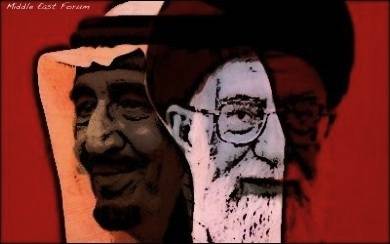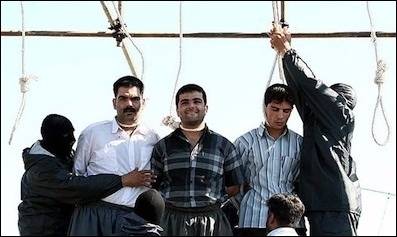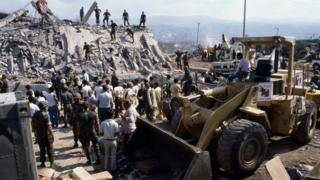Sure looks like an awful lot of executions are taking place.
Saudi Barbarity, Iranian Hypocrisy
by Tarek Fatah
The Toronto Sun
January 5, 2016

 1
1
This is an excerpt of the original article.

The idiom "pot calling the kettle black" was perfectly illustrated by Islamic Iran's outrage over the public executions of 47 people by Islamic Saudi Arabia on Jan. 2.
As horrific and detestable as the Saudi actions that included the beheading of human rights and democracy activist Nimr el-Nimr were, it was laughable to watch Iran's hypocritical self-righteousness in response.
Since 1979, Iran has executed tens of thousands of political dissidents, most infamously its state-sponsored execution of at least 5,000 political prisoners across Iran in the summer of 1988. Decades later the Iranian Islamic regime still makes a public spectacle of hanging political prisoners in city squares, using cranes to magnify the image of men writhing as they die a slow death by strangulation.
Iran is the only Mideast country that carries out more executions than Saudi Arabia annually and globally is second only to China — a fact lost on Iran's Supreme Leader Ayatollah Ali Khamenei, who in a fit of contrived self-righteousness warned, "divine vengeance will befall Saudi politicians" for carrying out the executions.

Iran carries out far more executions per year than Saudi Arabia.
According to Amnesty International, at least 151 people were executed in Saudi Arabia during 2015. While Amnesty does not cite figures for Iranian executions in 2015, it quotes "reliable sources" putting the number at 743 executions, at least, in 2014.
That said, there's no question Saudi Arabia's disgraceful actions have added a new and unnecessary complexity into a region extending from North Africa to the Indian subcontinent.
As a result, 2015 may well have been the calm before the storm. If building world consensus to confront the threat posed by the Islamic State (ISIS) and al-Qaida was a jigsaw puzzle, the Saudi action just transformed into Rubik's Cube.
Continue reading at:
Saudi Barbarity, Iranian Hypocrisy?
Saudi Barbarity, Iranian Hypocrisy
by Tarek Fatah
The Toronto Sun
January 5, 2016
This is an excerpt of the original article.

The idiom "pot calling the kettle black" was perfectly illustrated by Islamic Iran's outrage over the public executions of 47 people by Islamic Saudi Arabia on Jan. 2.
As horrific and detestable as the Saudi actions that included the beheading of human rights and democracy activist Nimr el-Nimr were, it was laughable to watch Iran's hypocritical self-righteousness in response.
Since 1979, Iran has executed tens of thousands of political dissidents, most infamously its state-sponsored execution of at least 5,000 political prisoners across Iran in the summer of 1988. Decades later the Iranian Islamic regime still makes a public spectacle of hanging political prisoners in city squares, using cranes to magnify the image of men writhing as they die a slow death by strangulation.
Iran is the only Mideast country that carries out more executions than Saudi Arabia annually and globally is second only to China — a fact lost on Iran's Supreme Leader Ayatollah Ali Khamenei, who in a fit of contrived self-righteousness warned, "divine vengeance will befall Saudi politicians" for carrying out the executions.

Iran carries out far more executions per year than Saudi Arabia.
According to Amnesty International, at least 151 people were executed in Saudi Arabia during 2015. While Amnesty does not cite figures for Iranian executions in 2015, it quotes "reliable sources" putting the number at 743 executions, at least, in 2014.
That said, there's no question Saudi Arabia's disgraceful actions have added a new and unnecessary complexity into a region extending from North Africa to the Indian subcontinent.
As a result, 2015 may well have been the calm before the storm. If building world consensus to confront the threat posed by the Islamic State (ISIS) and al-Qaida was a jigsaw puzzle, the Saudi action just transformed into Rubik's Cube.
Continue reading at:
Saudi Barbarity, Iranian Hypocrisy?


